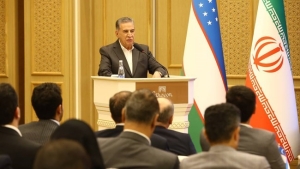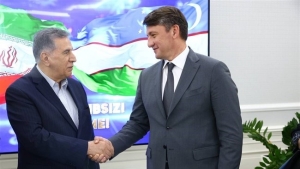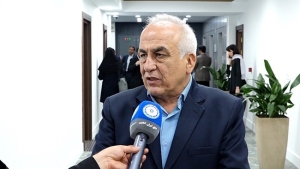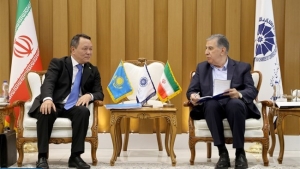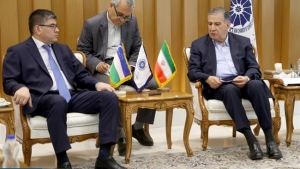Member Countries
ecocci
Iran seeking to enter into payment arrangements with OIC countries
Iran is seeking to set up independent payment systems with Muslim countries to avoid sanctions that hamper regional and international trade.
Iran’s chief banker said on the sidelines of a summit of central bank governors of the Organization of Islamic Cooperation (OIC) in Turkey’s Istanbul on Monday that he had discussed the issue of creating bilateral and multilateral payments systems in talks with counterparts from the OIC.
“This issue has never been raised at a multilateral level ... we are seeking to have it implemented with member countries of the OIC,” said Mohammad Reza Farzin.
Farzin, who is the governor of Central Bank of Iran (CBI), said the creation of payment systems with Muslim countries can facilitate the use of national currencies in trade.
He also held talks with the governor of the Central Bank of Turley, a key member of the OIC with which Iran has considerable economic and trade ties.
During the meeting, Farzin and Fatih Karahan discussed infinitives for expansion of monetary, financial and economic cooperation between Iran and Turkey, according to a report by Iran’s official IRNA news agency.
Iran has managed to enter into bilateral financial arrangements, including independent payment systems, with members of the BRICS grouping of developing countries, including Russia.
That has helped the country lessen the impacts of US sanctions targeting its access to the dollar-based international banking system.
Iran is seeking to replicate the experience in its dealings with the OIC, an organization which has 57 members.
Iran’s customs office figures show the country’s non-oil trade with members of the OIC rose by 14% year on year in the six months to late September to reach some $32.2 billion.
TRADE AND ECONOMIC POTENTIAL OF KAZAKHSTAN WITHIN ECO MARKETS IN THE NEW GEO-ECONOMIC REALITIES
Iran, Turkey urged to focus on joint investments
President of Iran Chamber of Commerce, Industries, Mines, and Agriculture (ICCIMA) Samad Hassanzadeh has urged the need for Iran and Turkey to focus on joint investments alongside promotion of bilateral trade.
Hassanzadeh made the remarks in a meeting in Tehran on Tuesday with Ali Rıza Güney, a Turkish foreign ministry official in charge of Iran and Iraq affairs.
He referred to the foreign policy of President Masoud Pezeshkian’s administration in reaching out to the world, and said that Iran is seeking to give a boost to its trade relations with all countries, including Turkey, in spite of all the pressures and restrictions caused by sanctions.
Highlighting Iran’s support for foreign investment, the Iran Chamber of Commerce president said that the Turkish investors are now present in Iran’s Azarbaijan region and are well respected by the Iranian government.
He also said that the ground is prepared for Turkish investments in Iran’s petrochemical, oil and food projects, as he believed that the pressure of sanctions will be eased in the near future.
The Turkish official, for his part, said that affected by foreign parameters, the level of trade between Iran and Turkey is far from the ideal point.
He referred to Iran’s rich mining reserves, while noting that the biggest potential of the country is its manpower.
Some 2.5 to 3 million Iranian tourists annually visit Turkey, with some of them buying residential buildings in the country, the official said.
He said that the two countries have to get prepared for the period when the sanctions on Tehran are lifted. The official, however, added that they should diversify transportation corridors and make more use of their neighborliness potentials.
Iran, Uzbekistan urged to take serious steps for expansion of ties
President of Iran Chamber of Commerce, Industries, Mines, and Agriculture (ICCIMA) says Iran and Uzbekistan have to give a boost to bilateral relations by taking more serious steps.
Samad Hassanzadeh made the remarks in an Iran-Uzbekistan Business Forum in Tashkent on Thursday.
He stressed the making use of the existing potentials can ensure long-term relations between the economic operators of the two countries.
The Iran Chamber of Commerce president, however, noted that further relations between Iran and Uzbekistan rests upon adjustment of trade tariffs, and preparing the necessary infrastructure in the areas of banking, customs and transportation.
“Our first objective is to increase the current (bilateral) $500 million trade to $1 billion,” Hassanzadeh said, expressing hope to achieve this goal by the yearend.
He complained that Uzbekistan’s tariffs on Iranian goods are higher than those imposed on other countries.
Referring to Iran’s special geographical position which he said provides every country with profitable trade through transit routes, he invited Uzbekistani businesspeople to invest in the North-South corridor and the development of Makran coast in southern Iran.
Chairman of Uzbekistan Chamber of Commerce Vakhabov Davron, also addressed the forum, noting that the volume of trade between Iran and Uzbekistan witnessed 29% growth last year.
Noting that the Iranian products are 20 to 40 percent less costly than those provided by other nations, he highlighted the need for Iran and Uzbekistan to launch joint committees of commerce
Iran seeks investment in Uzbekistan’s Khorezm energy, tourism projects
President of Iran Chamber of Commerce, Industries, Mines, and Agriculture (ICCIMA) says Iran and Uzbekistan can cooperate in infrastructural, energy, and tourism projects.
Speaking during an Iran-Uzbekistan Joint Business Forum in Khiva, west of Khorezm region of Uzbekistan on Friday, Samad Hassanzadeh said that both Iran and Uzbekistan enjoy abundant economic, natural potentials as well as expert manpower.
“We can engage in joint investment projects in the areas of energy, transportation, agriculture and tourism,” he said.
The president of Iran Chamber of Commerce also stressed that Iran and Uzbekistan enjoy huge economic potentials. He added that if the infrastructural obstacles are removed, they will witness significant increase in bilateral exchanges.
He expressed hope that Iran and Uzbekistan will witness further expansion in cooperation in the area of trade, industry and investment.
In another business forum which was held in Tashkent a day earlier, Hassanzadeh said that “our first objective is to increase the current (bilateral) $500 million trade to $1 billion.” He expressing hope that this goal will be achieve by the yearend.
He complained that Uzbekistan’s tariffs on Iranian goods are higher than those imposed on other countries.
Referring to Iran’s special geographical position which he said provides every country with profitable trade through transit routes, he invited Uzbekistani businesspeople to invest in the North-South corridor and the development of Makran coast in southern Iran.
Iran Chamber of Commerce president highlights expansion of ties with Uzbekistan
President of Iran Chamber of Commerce, Industries, Mines, and Agriculture (ICCIMA) has called for more enhanced exchanges between Iran and Uzbekistan.
Samad Hassanzadeh, who is on a visit to Uzbekistan, made the remarks in a meeting on Friday with Tashkent mayor Shavkat Umurzakov.
During the meeting, the two sides stressed that the trade ties between Iran and Uzbekistan is too low compared to the huge potentials of the two countries.
The Iran Chamber of Commerce president said that Iran exports an annual $2 billion worth of food abroad and also exports agricultural equipment, including tractors, to other countries.
He also referred to Iran’s good potentials in providing techno-engineering services and petrochemicals, construction of power plants, roads and bridges which he believed can also be used in economic cooperation with Uzbekistan.
Hassanzadeh added that Iran has invested some $4 billion in power plants and road building projects of Sri Lanka and Tajikistan.
He also said that Iran enjoys good potentials in the area of providing urban infrastructure and waste management which could be used for connections between the municipalities of Tehran and Tashkent.
Tashkent mayor, for his part, said that the ground is prepared for further cooperation between Iran and Uzbekistan’s capital.
Umurzakov referred to a new directive issued by Uzbekistan’s president, noting that new steps can be taken for cooperation with Iranian businesspeople.
Noting that Uzbekistan is the most industrialized country in the Central Asia region, he said that the country can serve as a gateway into this region for Iran.
He added that the trade exchanges between Iran and the city of Tashkent was reported at $100 million which he believed is too insignificant. The Tashkent mayor put his country’s GDP at $100 billion, noting that given Iran’s potentials, bilateral exchanges between the two countries have to further increase.
Businessman urges joint investments in Afghanistan
Mahmoud Siadat, the chairman of Iran-Afghanistan Joint Chamber of Commerce, has stressed the need for Iranian businesspeople to make joint investments in Afghanistan.
In an exclusive interview with Iran Chamber of Commerce newsroom, Siadat said that the situation in Afghanistan has underwent significant changes and many policies have been changed.
He said that the new policies taken by Afghanistan’s Taliban ruling government are hindering Iran from exports of final products to the country, warning about threats that Iran could be removed from the Afghan market or have a less active presence there.
“We have to move towards making investments or joint investments in the Afghan market,” Siadat said, adding that this would be a critical decision to make at this time.
Referring to the decline in Iran’s trade with Afghanistan with the re-emergence of Taliban in 2021, he however said that bilateral trade between the two neighboring countries has been steadily rising over the past three years.
Iran’s exports to Afghanistan stand at $2 billion at present and there is potential for the figure to rise to $10 billion, he said, but did not provide a timeframe for this increase.
Iran, Kazakhstan urged to enforce trade cooperation agreement
President of Iran Chamber of Commerce, Industries, Mines, and Agriculture (ICCIMA) Samad Hassanzadeh has underlined the need for speedy implementation of a trade cooperation agreement between Iran and Kazakhstan.
Hassanzadeh made the remarks in a meeting in Tehran with Kazakhstan’s Ambassador to Iran Ontalap Onalbayev.
Noting that the current $300 million trade between Iran and Kazakhstan is not consistent with the potentials of the two nations, stressing the need for them to make every effort to increase bilateral trade to a target $3 billion.
He also referred to a trilateral logistic agreement between Iran, Kazakhstan, and Russia which he believed could upgrade transportation among regional countries.
Considering that the two countries have solved banking issues which used to impede bilateral cooperation, especially on agricultural and livestock areas, Hassanzadeh said that the ground is now prepared for more joint investment projects.
The Kazakh minister, for his part, said that Iran and Kazakhstan have developed good cooperation on maritime, rail and road transportation, which need to be further expanded.
Noting that almost 70% of the volume of trade between Iran and Kazakhstan are Iran’s exports to the Central Asian country, the ambassador called for more increased exchanges on agricultural, petrochemical and constructional items which he believed could lead to an increase and balance of bilateral trade.
The ambassador added that the private sector operators of the two countries are not well informed about lifting the banking obstacles on the way of bilateral trade and they have to be briefed on this achievement.
Uzbekistan eager to use potentials of Chabahar Port
Uzbekistan’s Ambassador to Iran Fariddin Nasriev says his country is willing to make use of the potentials of the Port of Chabahar in southeastern Iran.
The ambassador made the remarks in a meeting in Tehran with President of Iran Chamber of Commerce, Industries, Mines, and Agriculture (ICCIMA) Samad Hassanzadeh.
Speaking during the meeting, the president of Iran Chamber of Commerce voiced Iran’s readiness to make investments in expansion of Uzbekistan’s infrastructure.
He referred to Iran’s high potentials in producing medicines, noting that the country stands ready to export pharmaceuticals to Uzbekistan and help transfer the technology to the Central Asian country.
Hassanzadeh also highlighted Iran’s transit routes which he said provide Uzbekistan with access to Europe.
The Uzbek minister, for his part, said that his country will soon be hosting a major investment forum, calling on the Iranian business actors to participate in the event.
Noting that Uzbekistan imports some $900 million worth of medicine each year, Nasriev called on Iranian companies to launch medicine production lines in Uzbekistan.
The ambassador said that his country has signed a contract with a major Iranian pharmaceutical company and also plans to give a boost to this cooperation.
Iran becomes 4th largest oil exporter in OPEC: Report
Iran has risen to become the fourth largest oil exporter within the Organization of the Petroleum Exporting Countries (OPEC) due to a surge in oil production and sales.
Iran's oil and gas condensate exports have now reached their highest level since 2018, when the United States withdrew from the Iran nuclear deal and introduced tough economic sanctions against the country, targeting its oil sales in particular, according to a report by Vortexa, which provides data on the global energy sector.
The report emphasized that Iran's oil and gas condensate exports now account for 9% of OPEC's total crude oil and gas condensate exports.
Iran exported 1.56 million barrels of oil per day from January to May of this year, 250,000 bpd more than Kuwait and Nigeria. This has elevated Iran's ranking to the fourth spot among OPEC's largest crude oil exporters.
Despite Western sanctions, Iran managed to increase its crude oil and gas exports to 1.7 million bpd in May, the highest level in the past five years.
The report cited the rise in Chinese oil demand and the expansion of Iran's oil tanker fleet as the main factors contributing to the surge in Iran's oil exports.













